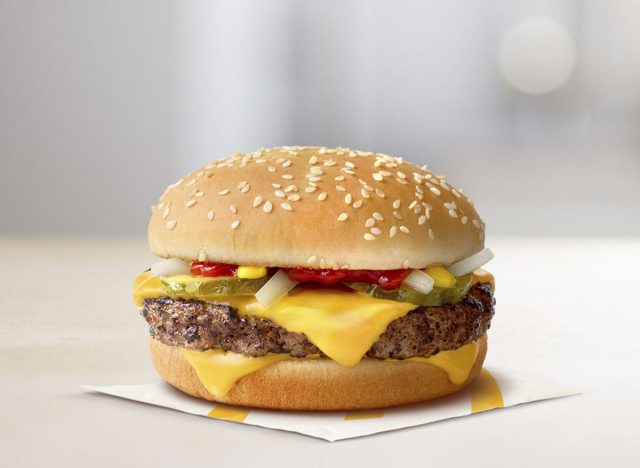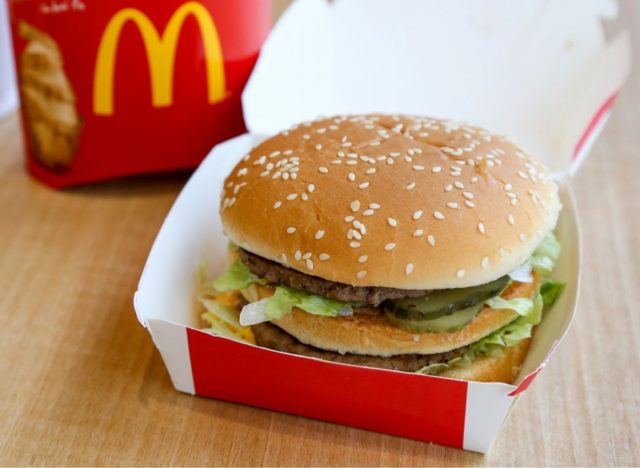Given that McDonalds sells the most hamburgers globally, it is not surprising that their beef receives a lot of attention. For a long time, a rumor was floating around that McDonalds bought its burger meat from a mysterious company called %22100% Beef,%22 which allowed them to make the claim that their burgers were beef when they really werent Some people (gasp!) claimed that the burgers were filled with worm meat. Both of these rumors have since been proven false.
Despite the unsettling rumors, one has to wonder how this fast food giant manages to handle its meat. Let’s talk fat about the details of the beef in your McDonald’s burger.
Where’s McDonald’s meat from?

Information supplied by McDonalds USA says that the company “partners with a global network of suppliers and farmers to provide quality ingredients and packaging materials.” The website goes even further and names Oklahoma City-based Lopez Foods as a key supplier of beef, pork, and chicken to the chain since 1968.6254a4d1642c605c54bf1cab17d50f1e
In addition, McDonalds points to Philadelphia-based Keystone Foods as a major meat supplier providing the chain with more than 150 million pounds of beef, 300 million pounds of chicken, and 15 million pounds of fish each year.
Keystone is also credited with creating the individual quick-freezing technique that enables it to freeze its well-known burgers while maintaining both flavor and texture. Additionally, McDonald’s claims that it collaborated with Keystone to create its wildly popular Chicken McNuggets.
Asked generally about the quality of its meat, McDonalds USA says “Our burgers are made only with 100% USDA inspected beef. There are no preservatives or fillers in our patties and the only thing ever added is a touch of salt and pepper on the grill. And our Quarter Pounder burgers are made from 100% fresh beef patties in the US.”
The process by which McDonalds burgers are made isnt a well-guarded secret. In fact, a Business Insider report from one of McDonalds largest meat processing facilities in Germany said that shipments of beef are checked for purity before being ground up in a large meat grinder. The patties are then machine shaped. Once made, the burgers are then individually quick-frozen and packed into plastic bags and boxes before being shipped off to restaurants in the U.S. and beyond.
Some have concerns about this meat and the treatment of animals.
However, billionaire investor Carl Icahn, who has previously supported causes related to animal welfare, has recently criticized the burger giant for its policies regarding animal welfare.
CNN reported just days ago that Icahn sent a scorching letter to investors saying that McDonalds is “failing” investors and misleading the public about the companys animal welfare policies related to how its pork supply is sourced.
Particularly controversial is the company’s use of “gestation” crates, which are basically just tiny stalls where pregnant sows are kept and have very limited movement.
According to CNN, McDonalds had pledged in February of this year to completely stop using the crates by 2024.
But Icahn argued that the firm’s assertion that the majority of its U S. It was a “cynical fabrication” that sows kept in gestation crates didn’t produce pork. “.
In response, McDonalds said to CNN: “While the company looks forward to promoting further collaboration across the industry on this issue, the current pork supply in the US would make this type of commitment impossible.” It also said that Icahn’s demands to stop using crates would result in significant cost increases that would “place a burden on all aspects of our business, our supply chain, and McDonalds customers.” “.
Additionally, the business claimed that difficulties brought on by the pandemic and a “devasting swine fever” were to blame for its inability to meet previously stated animal welfare targets. ” Icahn called these “poor excuses. “.
Sign up for our newsletter!
There are also antibiotics concerns.

McDonald’s claims to be attempting to limit the use of antibiotics in its meat supply. Since antibiotics are known to contribute to the development of antibiotic-resistant viruses, the majority of fast-food restaurants try to avoid or use less meat that has been raised with them.
The companys website states that “In August of 2016, we accomplished our goal to only source chickens in the U.S. not treated with antibiotics important to human medicine.” The company adds it is making progress with beef as well—”In December 2018, McDonalds announced a policy to reduce the overall use of antibiotics important to human health, in our beef supply chain. Our policy covers for our top 10 beef sourcing markets around the world, including the U.S., representing more than 85% of our global beef supply.”
Consumer groups are somewhat more critical of the Golden Arches’ attempts to reduce the use of antibiotics in the chain’s meat supply, which is unfortunate for them. McDonalds, Wendy’s, and Subway received a low grade for their use of antibiotics in their beef supplies in the most recent Chain Reaction report, which is produced annually by a coalition of consumer advocacy organizations, including Consumer Reports and The Center for Food Safety.
According to the report, Subway and McDonald’s received C grades for adopting responsible antibiotic use policies, but neither company has started putting them into practice. ” In addition, McDonalds was singled out for “…. failing to adhere to its commitment to establish targets for reducing the use of antibiotics in its beef supply by the end of 2020 “.
Burger King and Arby’s, competitors of McDonald’s, received “F” grades for failing to take any public action to reduce the overuse of antibiotics in their beef supplies. Top performers in the study included Panera and Chipotle. For the sixth year in a row, both businesses received an “A.”
Despite this, a few McDonald’s products have become healthier over the past ten years. Read all about them here. Alan Krawitz A seasoned journalist with 25 years of experience in New York City, Alan Krawitz has worked for a number of media outlets, including Newsday, Zenger News, and Long Island Press.
Is this content interesting for you? Join our FREE Daily Newsletter
Every day, get the best diet tips and cooking tips Something went wrong, please try again
Get ready, you are in!
You will now receive the best and most recent food and healthy eating news daily in your inbox. More in Restaurants
-

Taco Bell Plans to Become As Big As McDonalds
-

Chick-fil-A Is Americas Favorite Fast-Food Chain
-

4 Situations That Make You Tip More
-

7 Chains That Serve the Best Fried Chicken
-

Starbucks Strikes Are Shutting Down Dozens of Locations
McDonalds: Behind the Scenes of the Menu | Good Morning America | ABC News
FAQ
Where does McDonald’s get their beef from?
With more than 150 million pounds of beef, 300 million pounds of chicken, and 15 million pounds of fish delivered to McDonald’s annually, Keystone’s US operations are proud to produce and supply the highest quality beef, chicken, and fish products.
Where is McDonald’s meat made?
McDonald’s restaurants in California, Alaska, Hawaii, Nevada, Oregon, and Washington prepare and serve those burgers. Although Cargill has been in the beef business in Fresno since 1938, the Fresno plant opened in 2008 to serve McDonald’s by supplying beef patties to its restaurants in six western states.
Why does McDonald’s meat taste different?
In a statement released on Monday, chef Chad Schafer, senior director of culinary innovation at McDonald’s USA, said, “We found that small changes, like tweaking our process to get hotter, meltier cheese and adjusting our grill settings for a better sear, added up to a big difference in making our burgers more flavorful than ever.”
Does McDonald’s import beef?
Does McDonald’s USA import beef from other nations? The majority of the beef used in McDonald’s U S. restaurants is raised domestically, %22although we import a small percentage of our 100% beef from suppliers in Australia and New Zealand to supplement our U S. purchases,” the company says.
